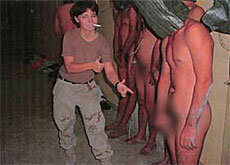Centre heals the scars of torture

As debate rages over prisoner abuse in Iraq and other countries, therapists in Switzerland are helping hundreds of torture victims to rebuild their lives.
Seven years to the day after the United Nations Convention Against Torture came into force, the international body says the practice “remains a serious problem”.
The UN is using this year’s International Day in Support of Victims of Torture to urge governments to commit to a world without torture.
On Friday Switzerland signed the optional protocol to the UN Convention, which comes into force once it has been signed and ratified by 20 states.
Independent experts will be given access to prisons run by countries which have signed up to the protocol.
The human rights group, Amnesty International, estimates that torture occurs in more than 100 countries every year.
Some of the victims eventually find their way to the door of the Bern-based Outpatient Clinic for Victims of Torture and War.
“We have more people in need than we have hours in the day to help them,” said Brigitte Ambühl, a doctor and head therapist at the centre.
The clinic, which helps around 200 victims including 30 children, is funded by the Swiss Red Cross. It recently opened a smaller office in Zurich.
Sexual abuse
One patient they are treating is a female political activist who was arrested when she was 19 and sexually abused for five years in a Turkish prison.
When she arrived in Switzerland she suffered flashbacks, panic attacks and nightmares, but after three years of therapy she is now able to cope on her own.
She controls flashbacks using visualisation techniques learned at the clinic, picturing her favourite garden in Turkey.
Ambühl says torture victims often blame themselves for what happened to them, so therapy must restore a sense of control and confidence.
“The goal [of torture] is lifelong destruction of the personality – and ethnicity,” said Ambühl.
When they emigrate, many victims of torture feel ostracised, which adds “trauma on top of trauma”.
Open mind
Ambühl urges people to keep an open mind towards ethnic groups which are often associated in the media with crime.
“People from war zones and prison camps aren’t the same as those of us who grew up in Switzerland. It’s not a question of a bad person or a bad temper, it’s an illness – and compassion is a great healer.”
The clinic also treats the families of torture victims. One notable case was a young girl whose family came to Switzerland after her father disappeared in an ambush in Yugoslavia. His body was never found.
The girl’s mother lived in hope of his return – and in fear of the world, says Ambühl.
The four-year-old girl, who had no memories of attack, became afraid to go out and ate sweets until her teeth rotted.
But after two years of group therapy with other children who lost a parent in war, she eventually understood that her father was dead.
She was able to share this with her mother, who was then able to come to terms with her husband’s death.
“That little girl put the family on the road to recovery,” said Ambühl.
swissinfo, Elizabeth Meen
The United Nations International Day of Support for Victims of Torture highlights the need for action in countries with a known history of prisoner abuse.
Amnesty International estimates that torture occurs in more than 100 countries worldwide.
The International Committee of the Red Cross documents cases through prison visits.
The Outpatient Clinic for Victims of Torture and War in Bern treats 200 patients, including 30 children.
The clinic recently opened an office in Zurich.
According to its website, about 60% of patients are male, and they come primarily from Turkey (39%), Bosnia-Herzegovina (20%), Serbia/Kosovo (15%) and Iraq (8%).

In compliance with the JTI standards
More: SWI swissinfo.ch certified by the Journalism Trust Initiative











You can find an overview of ongoing debates with our journalists here . Please join us!
If you want to start a conversation about a topic raised in this article or want to report factual errors, email us at english@swissinfo.ch.